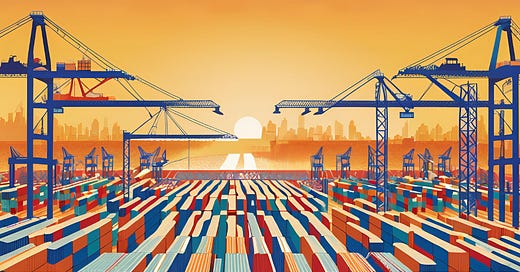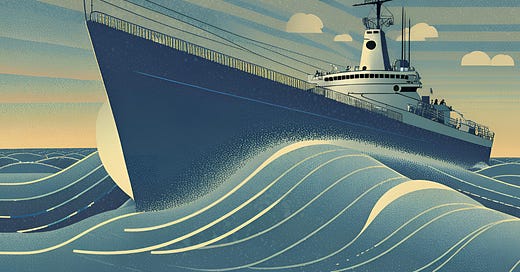
The global economy is in a period of rapid transformation as geopolitical competition grows, climate change worsens and national security rises to the top of many countries’ priority lists. The return of Donald Trump, President of the United States (US), has compounded these tectonic shifts, with the threat of trade wars and protectionist policies returning to the fore. Once a champion of free trade, Britain now faces a multitude of geoeconomic challenges, from growing the economy to reinvigorating critical industries. So, in this week’s Big Ask, we asked seven experts: Should Britain rethink its commitment to free trade?
Associate Fellow, Council on Geostrategy.
The United Kingdom’s (UK) forthcoming industrial and trade strategies will need to be delivered in a challenging and dynamic geopolitical environment, with its traditional economic partners increasingly looking inwards. However, as a so-called ‘middle power’ and with a historically open economy, uniquely specialised in services exports and reliant on overseas investment, there is no alternative to looking out to the world to ensure Britain’s long-term economic prosperity.
A fundamental goal should be to sustain the UK’s impressive record of attracting global investment while improving its export potential. Given Britain’s export profile for services is approximately; a third to the US, a third to the European Union (EU), and third to the rest of the world, His Majesty’s (HM) Government is right to stress continued engagement with traditional and emerging markets. Indeed, further diversifying British exports is likely to be a source of greater prosperity and resilience.
Global trade in goods has stalled, but global trade in services looks set to continue growing. International trade is projected to grow broadly in line with global Gross Domestic Product (GDP) over the next 30 years, but demand for services will increase more rapidly in the coming years. The UK remains well placed to capitalise on this opportunity, if it trades on its strengths.
Research Fellow on National Security, Council on Geostrategy
Any British government’s approach to international trade should always be to pursue the best possible trading terms it can for the UK. In the past, when Britain was the world’s only industrial nation, this meant an adherence to free trade. Yet somewhere along the line, the fact that free trade was once in the UK’s interests has become confused with it now being regularly proffered as a value by which Britain should always stand. The simple fact is that total faith in free trade is no longer in the UK’s interests – and it has not been for some time.
Globalisation has not brought about the benefits it promised. The end result of this global free trading experiment was twofold: to empower the economies of our adversaries; and to enrich a tiny minority in free and open countries to the extent that wealth gaps are the most severe they have been for well over a century.
A rethink is indeed in order. Careful thought should now be taken to undo the damage that post Cold War hubris brought about. To be clear, Britain should not turn to protectionism. Instead, a path of hard negotiation, but with an understanding that all negotiation requires compromise somewhere, is required to once more drive trading arrangements which best work for the people of the UK.
An oft forgotten byproduct of globalisation has been that, despite the UK’s claims about remarkable climate change successes, it has essentially outsourced its emissions to the dirtier industries of third parties. HM Government should start by considering carbon taxes on imports produced in (not imported from, to avoid tariff avoidance via third countries) places with terrible environmental records.
Patrick Horgan OBE
Independent Adviser on strategy and geopolitics
Amid today’s maelstrom of conflict, tariffs and competing territorial claims, any unquestioning advocacy of free trade, rule of law and their rhetorical companion, ‘the rules-based international order’, can seem quaint and quixotic. Despite free trade’s many incarnations, as theory, slogan, aspiration or policy position, it does not exist in any literal sense. For all the progress made in global trade liberalisation, tariffs and trade friction have always persisted, even at the peak ‘World is Flat’ phase of globalisation.
The UK has been a beneficiary of open, stable and rules-based international trade. Given the size, structure and relative openness of the British economy, there is a strong rationale to maintain a commitment to those systems and values which maximise the UK’s access to international markets and support a predictable trading environment for business. But this is not a moment when the systems and norms of international trade are reliably determined by consensus or multilateralism. The People’s Republic of China (PRC) maintains a profoundly different economic system, generating distortions and provoking political reaction from trading partners. Meanwhile, the Trump administration’s narrow view of national interest and disregard for international norms is evident in daily headlines from the US.
The UK and other like-minded partners must contend with salvaging a relatively open and rules-based environment for international trade where possible, while adjusting to cope with a radically changed geopolitical context. The Department for Business and Trade (DBT) recently advertised for a ‘Head of Tariff Strategy’, with responsibilities including ‘scoping work into how tariffs can support growth’ and ‘developing a coherent policy approach…to emerging issues such as US tariffs’. Evidence of HM Government’s attempts to grapple with precisely this challenge.
Dr Ksenia Kirkham
Lecturer in Economic Warfare, King’s College London
Over the last 50 years, the rhetoric of free trade in the UK has been prominent and remarkable. The memories of Margaret Thatcher’s speeches on privatisation and market liberalisation form part of Britain’s national identity. However, although neoliberal narratives materialised in broader economic reforms in Britain, it would be more accurate to characterise the ‘free market’ as an ideology. Despite all the known benefits of free trade, most developing states in an increasingly multilateral world re-evaluate the essence of ‘free trade’ by referring to Friedrich List’s famous metaphor to point to historical evidence. The most vocal proponents of liberalisation, such as the UK and the US, used protectionist measures most aggressively to industrialise and gain competitive advantages. Once they gained a competitive advantage, they ‘kicked away the ladder’, making it difficult for most states to catch up.
Moreover, the elimination of traditional trade barriers (e.g. tariffs, quotas, subsidies) was accompanied by the emergence of covert neo-protectionist practices, such as macroeconomic interventions manipulating banks’ lending behaviour, economic sanctions, technical and security measures impacting export and re-export monitoring and control.
With lots of neo-protectionist measures on the rise – such as sanctions, export controls and other means of economic warfare – the insistence on the commitment to free trade risks appearing misleading not only to Britain’s rivals but also to its partners, who express concerns regarding coercive and extraterritorial instruments of economic statecraft which undermine their state sovereignty. Therefore, to restore its leadership, the UK should rethink the limits to its strategic autonomy from the US, refrain from following an aggressive protectionist course against the PRC and other key trading partners, and restore political transparency, without covering its own protectionist measures with the mantra of ‘free trade’.
Member of the Advisory Board of the China Observatory, Council on Geostrategy
The UK is in a precarious and vulnerable state. As part of the ‘growth agenda’, the government would like to exploit opportunities to boost trade, with exports accounting for a third of GDP. As an open economy, the country has a long-standing, but not historically persistent, commitment to free trade. It is possible that under exceptional circumstances, Britain’s trade posture could change, as it did in 1932. Cue exceptional circumstances.
The breakneck speed of the Trump administration’s tariff announcements and suspensions, retaliatory measures from Beijing, and the latest general tariff on steel and aluminium may only be the opening salvo. General or reciprocal tariffs could follow. A general trade war has not broken out, but it might, and in that event, the UK could certainly be affected.
The PRC, which HM Government is seeking to engage more, is protectionist too, but in a different way. It is a classic mercantilist state, and seeks, via unique expansive industrial policies and non-tariff trade restraints, to bolster its already dominant position in global manufacturing and exports at the expense of other nations.
Having voluntarily left the biggest free trade area in the world in 2016 when it withdrew from the EU, Britain now has to decide if and how free trade can serve the nation in an increasingly fractured and protectionist world. Facilitating trade with the EU is important, while elsewhere, selective rather than general tariffs may be appropriate. HM Government should pursue, however, an industrial strategy designed to exploit and scale up the nation’s innovation capacity in science and technology, and strengthen the economy’s resilience in trade and commerce.
Senior Research Fellow in Science, Technology, and Economics, Council on Geostrategy
For many people, free trade has lowered prices, broadened consumer choice, and increased the quality of goods available. But its benefits have been asymmetric. In the period of hyper-globalisation – the 1990s and 2000s – domestic economies were made to serve the global economy rather than the other way around. And, contrary to the economic zeitgeist, deeper integration did not automatically lead to greater prosperity. Instead, it made it hard for countries to protect themselves from international competition, accelerating the decline in manufacturing in so-called ‘developed’ countries and moving it to nations such as the PRC.
Together with the 2008 financial crisis and the austerity policies which followed, these events led to widespread resentment and distrust of global institutions and elites. We are now witnessing the consequences of this.
And so we are at a critical juncture in world history. There is the ongoing trade war between the world’s two largest economies. There are countries (and coalescing groups of countries) whose interests are predicated on Britain and its allies becoming weaker. There are those intent on monopolising vital global supply chains. Countries around the world are turning to industrial policies, heavily supporting strategically important industries.
In this context, Britain needs to review its trade policies. The highest priority of any government is the safety and security of its citizens. So, the UK should not embrace protectionism – but it does need to provide shelter from the global maelstrom, deepen alliances with reliable partners, and work with them to shape trade rules.
Economist, University of Oxford and Adjunct Professor, London Business School
In these times of tariffs and trade wars, the UK should reconsider how best to further the aims of a multilateral trading system so that it provides a level playing field for countries and also looks after those who lose out when a country specialises in some sectors and not others. But Britain’s commitment to the values of an open trading system should be continually affirmed as openness has helped to raise standards of living while protectionism increases uncertainty and hampers business investment.
The way to further the multilateral trading system in the current global environment will likely require plurilateral means. In other words, Britain should work with other countries to help set rules for specific parts of international trade, for instance, digital standards. The UK should also focus on addressing the distributional impact of trade so that those who have not benefitted can be supported through the domestic fiscal system. It would be through such efforts which demonstrate how economies can benefit from fair trading rules, and where the distributional impact on people and communities is addressed, that the value of international trade can be shown to remain of value in the 21st century world.
If you enjoyed this Big Ask, please subscribe or pledge your support!
What do you think about the perspectives put forward in this Big Ask? Why not leave a comment below?













Categorically not. Free trade is what drives competition and innovation, and has immeasurably enriched the world over the past 60 or 70 years.